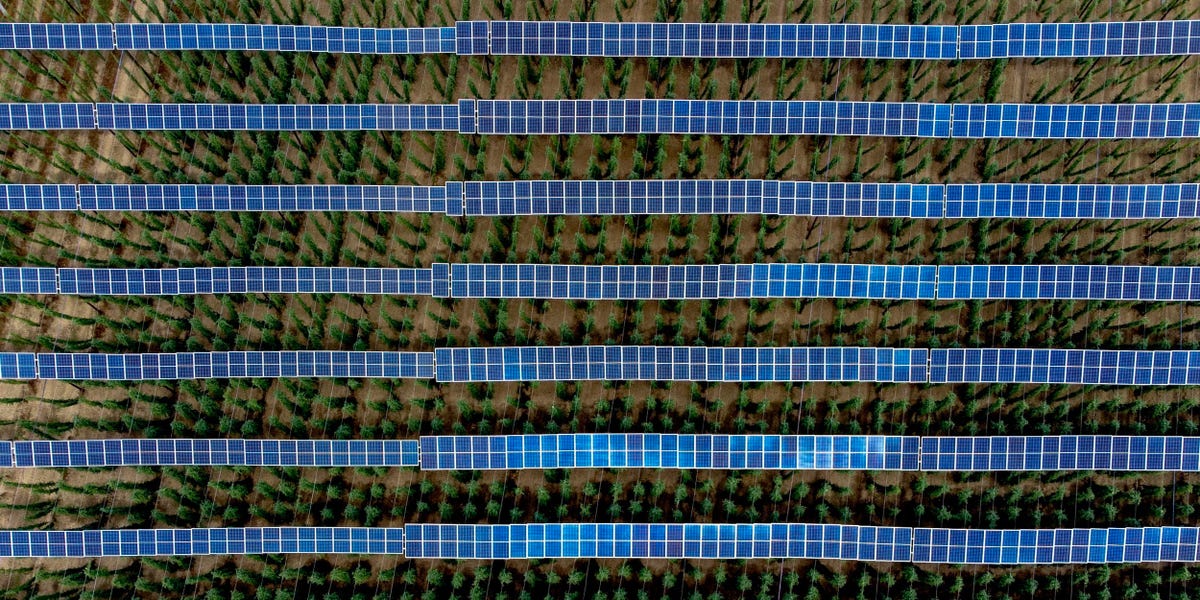Cheap energy being framed as some kind of problem is a great demonstration of why we need a free press that isn’t solely owned by billionaires
They could always just close their coal power plants. Idk why they don’t.
My guess is that in a climate like Germany’s, solar isn’t consistent enough to provide the steady baseline power that coal plants can.
One of the complexities of power infrastructure is that demand must be met instantaneously and exactly. Coal and solar typically occupy different roles in a grid’s power sources. Coal plants are slow to start, but very consistent, so they provide baseline power. Solar is virtually instantaneous, but inconsistent, so it’s better suited to handle the daily fluctuations.
So, in a place like Germany, even in abundance, solar can’t realistically replace coal until we have a good way of storing power to act as a buffer. Of course, nuclear is a fantastic replacement for coal, but we all know how Germany’s politicians feel about it…
Coulnd’t we use solar to pump water into reservoirs, and then let the water flow through hydroelectrical dams when we need the electricity?
[yes](> https://en.wikipedia.org/wiki/Pumped-storage_hydroelectricity)
Taking into account conversion losses and evaporation losses from the exposed water surface, energy recovery of 70–80% or more can be achieved. This technique is currently the most cost-effective means of storing large amounts of electrical energy, but capital costs and the necessity of appropriate geography are critical decision factors in selecting pumped-storage plant sites.
Oh wow, I had no idea this existed. Awesome!
Wait Are these not common where you are?
We have a lot of dams, but I haven’t heard that we were pumping water into the reservoirs.
We also don’t have, like, fields of solar panels, as far as I know. I think it’s too cloudy here. But we have wind turbines, especially in coastal areas.
We also know building nuclear takes 20 years and costs more than building thrice the capacity in renewables + Germany has no long-term nuclear storage, only temporary one’s a la Simpsons.
Germany had 17 active nuclear plants in 2011 and decommissioned them all by 2023.
They were already past their expiry date. Germany would face the same shit France is facing with their old reactors.
You are correct that when you build one new plant every 25 years it takes a long time to spool the industry, the skills, the testing and the manufacturing capability up to build new nuclear.
In countries that regularly build new nuclear it takes 5 years, comparable to any other power source. When France when through their mass-conversion to nuclear in the 70s (following the oil crisis), they put 2-3 new nuclear plants into operation every year.
All new western nuclear is in “production hell”. We don’t build them often enough to retain the skill set or for industry to dare invest. So they become massive state-run enterprises.
If we were serious on solving our climate crisis we would build nuclear power plans en masse.
We also know building nuclear takes 20 years and costs more than building thrice the capacity in renewables
Nonsense, https://nanonuclearenergy.com/, https://www.nuscalepower.com/, http://smart-nuclear.com/, etc.
Well it is a problem, sort of. It’s a failing of the market.
But it does open up another market for energy storage so it will save itself through regular marker forces.
But we absolutely want energy suppliers to make money off solar (over a year) or they will simply stop building more of it. I’m not sure if the German state is losing money on this though, in which case they absolutely need to build more storage.
I’m getting really worried about how energy is going to be generated in winter once solar and batteries completely dominate energy production in the summer.
The thing is that it does represent some problems. First of all if Germany has already reached the limit of what it can do with solar then that’s sobering news because it is far from 100% sustainable. More solar than it can use? We should ask why. Not enough storage capacity: that’s a problem when consumers use more power in solar off-hours. And if energy prices become too volatile or even negative, that could harm the non-solar energy provider who provide the backup that solar requires.
I get the anti-corporatist message and all, but really we should look a little more deeply than our favorite narrative if we want to understand things. Reddit also needs to realize that business pages cater to business interests and investors, so not every headline is framed in terms of consumer benefit. News outlets can publish articles for business readers whether or not they are owned and puppeted by them.
Reddit?
The only issue is they have not enough storage capacity for the excess.
That’s a global problem unfortunately.
We do not yet have effective and economical means of storing energy in grid scale quantities that are readily deployable near where that power is consumed.
It’s a huge problem actually, the biggest one facing renewables like solar.
This is a problem I’d very much like governments to sink a bit of money into. Sure, we don’t have 100% efficient energy storage, but we certainly have technology that does the job. Liquid air energy storage, fly wheels, thermal sand batteries etc, can be installed anywhere and are available right now. Not to mention pumped hydro if you have suitable terrain.
There’s a lot of stuff that we could build, and honestly, we just need to build it, now, even if it’s not profitable, or super efficient. There’s a bunch of solar and wind around the world not being built, or curtailed because prices go negative when there’s no one to store it.
The free market sucks. We need government intervention to do the things the profit motive won’t.
but we certainly have technology that does the job.
Absolutely not if we’re talking about nation-wide energy storage. The world’s largest STEP, Hongrin-Leman, Switzerland, which occupies a considerable amount of space, has only a capacity of 100 GWh, which represents less than 1h15 of the winter night consumption of a country like France which consumes 70 GW at that time.
It would take 10 to sustain one night without wind, as you can have several each year. Then we would have to fill them entirely in one day for the next night which is impossible.
And that’s just for the problem of capacity, such a STEP generates less than 500MW of power, so it would actually take 140 STEPs of that size to provide enough power.
And we’re talking about today, where most cars and heating are still fossil-fueled and need to be replaced by electric.
Unless you find a technology that is now a miracle, running a country on solar and wind without hydro-electricity or nuclear is science fiction.
Sure, we don’t have 100% efficient energy storage, but we certainly have technology that does the job.
We only need about 40% overall efficiency to beat the theoretical limit of fossil fuel counterparts.
Power being priced negative is awesome. We need more of it imo, make energy so abundant that it makes processes that were previously too energy-intensive viable, and enables a massive increase in both residential and grid storage capacity.
My opinion is that Na-ion batteries are the way for bulk grid storage and apartment/home storage nya.
They use hyper abundant materials and are now reaching the point of decent endurance, and if you arent bothered by them being heavy (as is the case for grid and residential storage), they’re fairly comparable to Li-Ion without the usage of relatively rare Lithium.
Yeah, negative prices finally incentivize storage technologies such as battery storage.
How does it incentivize it?
The problem with energy storage isn’t a lack of incentives, it’s a lack of solutions. There are currently no proven, grid scale, economical, and robust energy storage solutions.
There are lots of storage solutions that work within limited geographical areas (ie. Pumped hydro). But past that it’s a crap shoot.
Batteries are absolutely nowhere near the capacity or longevity needed for grid scale storage.
The largest battery storage system in the world is primarily used for grid leveling and emergency power. And would be depleted in minutes under its maximum load.
It is also an incentive to shift demand when there is plenty of renewable power: charge your car , do the laundry and so on
Looks like it is possible to do in California already today, for hours, not minutes: https://reneweconomy.com.au/deeper-longer-cleaner-big-batteries-extend-domination-of-californias-evening-demand-peaks/
The battery solutions on grid scale are available now. They need to be built and paid for. Negative prices might help motivate investors.
TIL, thanks for the link!
That’s pretty awesome ngl :p
The bigger the incentive the more money gets spent on funding the necessary R&D.
If you can actually get them. According to the article, it appears that an end user with his own battery system cannot actually get paid to store energy.
This is why the US is working so hard to stop renewables. Rich people don’t make any money when power is free.
Sure they do all they need to do is a bit a regulatory capture and free electricity for them means more profits while you continue to pay the same or higher prices.
It gets even more absurd. The southern states blocked building large power lines to transport cheap wind energy south. Now they struggle because the chea renewable energy cannot go there. So while there is plenty of renewables in the north the south still runs coal plants to provide local energy. But then the people in the north have to pay for “network fees” because the South couldnt take their energy.
Because of this it was suggested to split the German energy market in two, where the south which fought against renewables would have to pay the actual electricity costs instead of leeching of the North that properly build up renewables. This was fought teeth and nails because the South of Germany is like Texas but with an even worse superiority complex.
Physicists are warry about splitting atoms; historians are warry about splitting Germany.
It’s okay, this time it’s a horizontal split, not a vertical one. That makes it okay and completely different.
Yeah there are already a few splits. The Aldi equator, the Weißwurstäquator.
Idk, we could have saved millions of people if we had done this in 1918
“South Germany” Du meinst Bayern, oder ist Hessen auch dabei? xD
Hauptsächlich Bayern, aber Hessen und BaWü haben sich mWn. bei Netzausbau und Ausbau erneuerbarer Energien bisher auch nicht mit Ruhm beckleckert.
Aktuell wird doch ne Stromtrasse durch BW gebaut. Diese lächerliche Nummer von wegen, wir hätten gerne Strom, aber keine Trasse, war eine astreine CSU Nummer.
Oh no! Failing from success! /s
Free energy!
This is the entire reason why countries like China are investing hard into ultra-high-voltage transmission lines.
While regions like Xinjiang and Inner Mongolia have immense wind and solar potential, getting that electricity to the population centers is challenging.
Selling electricity to Eastern Europe, to Northern Africa, hell even to the Middle East is an option if Europe is truly operating an electricity surplus.
Ironically pursuing high voltage low potential and low voltage high potential are required in equal amounts for future energy grids lol.
EDIT: Had some words flipped mb
What?
Potential means voltage in the context of electricity
A supercapacitor is defined by low voltage but high potential for energy storage, as in high capacitance. It’s energy per unit of mass is far greater than regular batteries. Therefor we have low voltage storage solutions and high voltage energy distribution across a grid, which results in the witicism of the above comment.
If potential meant voltage in every context then we wouldn’t need the word voltage.
Europe and the US already have UHV transmission lines. Grid interconnects and long-distance transmission have voltage between 500kV-1,000kV
China is still developing its national grid.
Look at a map of the European power grid: https://www.researchgate.net/figure/Map-of-European-high-voltage-transmission-grid-Source-Adapted-from-GENI-2011_fig1_281127145
Now repeat your claim again, but this time be serious.
I mean… Good? Shouldn’t that be the goal, electricity at no cost to the people?
Won’t someone think of the poor capitalists who can’t love better lives then those around them!
/s, just in case.
Well in a very basic way, more solar than we can use means there is waste. Too many panels produced and installed. And if solar generation capacity is going to waste, that means Germany doesn’t have enough storage to keep it in, and that’s a problem. And who knows what negative energy prices will do to the other power producers who back up solar (which, you know, doesn’t produce at night). That would be a problem. So there is a little more to this than just the headline. Also, Reddit needs to learn that business stories are written for investors and business readers and they don’t frame everything in terms of broad human interest.
No such thing as too many solar panels, only not enough storage.
There’s no upper limit on either really. But why would you ever install more than you can store? That’s still waste. Solar panels have nonzero cost and environmental impact.
It is in some cases economical to install way too many solar panels, because production is variable. If you install enough for 100% production on a sunny day, then on a cloudy day you only have 70% of what you need. So instead you install 150% of what you need, so you never go below 100%.
Then the question is what to do with the excess during sunny days. Storage didn’t used to be a problem because early solar adapters could sell it to other parts of the grid who are still using fossil fuels, and fossil fuel production plants can ramp down as needed (natural gas especially).
It’s only now that renewables are becoming such a large portion of the grid that it’s getting difficult to ramp the remaining fossil fuels down and up fast enough that we need to look into storage. Current storage options are extremely expensive though, similar in cost to a solar panel installation (at least on the residential side).
It costs something to build and maintain the infrastructure to distribute power. Typically that cost is recovered through payments for the generation of the power, which becomes a problem if generation costs get too low. It suggests that we should probably consider a different model of paying for that infrastructure now that the reality of generation has changed.
Oh well. I guess they will just have to municipalize the grid.
No. That’s like saying the UK has too much wind power because our prices occasionally go negative. What Germany might not have enough of is battery and other storage
Did you know that the best way we currently have to store energy are dams? In most dams you can install a pump to take water and store it higher, then when energy is needed you simply open the turbine.
The problem with dams or pumped storage is it only works in specific places where you have a higher place to put lots of water.
Seems like dams should only be used in those situations then…
You need a certain kind of landscape for that. I think the UK only has a couple of pumped storage power stations due to lack of suitable sites
Hydrogen and Methane Power-to-gas can store more power for longer than hydro pump
I’m not sure why you’re getting downvoted, but companies are looking to use hydrogen fuel cells for 18 wheelers for just this reason. They won’t have to stop for gas even on long trips because the energy density is very high and the weight is less.
Here are a few charts about it from the DOE: https://www.energy.gov/eere/fuelcells/articles/fuel-cell-and-battery-electric-vehicles-compared
Fuck that title. No such thing as too many solar panels. The only thing that is bad is how the energy is used or if it’s wasted. Free energy should mean algae production which would mean carbon negativity. Negative energy price should mean negative carbon emissions, get on it.
The grid needs the supply and demand to be balanced for the power to be stable. Otherwise you get fluctuations in voltage and frequency which are both bad for anything connected to the grid.
There can absolutely be an oversupply of energy. We need to either find ways to store that surplus energy, or use it for something positive like desalination or carbon capture.
There’s been more solar and battery storage capacity installed this year+last year in USA than all prior years combined. And those investments are happening because the return of investment is huge. Those batteries are there to smooth out the supply and helps keep the grid stable.
You are right, this is BS.
I recently researched this and Germany’s grid is quite “smart” (the oldest technologies involved, such as DECABIT or VERSACOM over PLC, very much predate the term “smart grid” but whatever) and power plants and households are connected for production and load control. Power plants are required to participate but households can use a load management system for water tank heating (the basic premise is that specific frequency impulses are sent over the power grid for primitive (originally relay-based!) logic in DECABIT meters to switch depending on the assigned device group, and meters count in lower-price mode while the load is activated for a guaranteed number of hours each day; you can manually override the switch for expensive on-demand water heating) and/or HVAC (here, a smart thermostat is usually used that gets real-time energy prices and decides based on its temperature range settings if it saves money to run heating/cooling).
People in Texas apparently hate this (muh freedom), and look how reliable their grid is!
Anyway, solar, unlike coal or nuclear, is absolutely capable of going off-grid if necessary. There is an MPPT system in their inverters that usually works to operate the panels at the optimal voltage & current so that it can suck the most power out of them but it can be overridden to work at below 100% efficiency, or even 0%. This will cause the panels to run with no current draw and get about 20% hotter but they are designed to withstand this. Similarly, wind turbines can be braked, water can be passed outside turbine shafts and so can pressurized steam if you really need to cut production quickly. Still, this is an emergency condition, it is preferred to use pumped hydro (responds in 1 minute, limited capacity) or batteries (respond in seconds, very limited capacity) or lower coal/gas-based production (responds in 3-20 minutes for as long as you wish) or load-side management to regulate the grid, as it wastes no power.
The system is very complex and robust, the frequency (the variable most dependent on production/load balance) only dips below 49.8 Hz about once per a few years (the emergency value that was reached in February 2021 in Texas and can only be sustained for minutes before total blackout is -1% from nominal (49.5 or 59.4, respectively) and has never been touched in Europe’s modern history).
(You’d think it would be voltage what falls in case of too little power but it can be readjusted quite easily with switched transformer taps and, oddly enough, reactive power management (connecting a few capacitor/inductor banks to mains) when necessary, however frequency control is the difficult part.)Germany actually spends money to stop Denmark producing power on windy days when prices get too low. Instead we could be making hydrogen and storing it in so many creative ways
Its ‘free’ anyway so there should be no concern about how much of it is lost in conversion
Nothing is free. Equipment costs money and time to build, operate, maintain, and repair.
The equipment to harvest energy, is built already and is practically being held inactive, because companies can’t make money off it. If we could invest in ways to convert even some part of that excess energy into energy that could be sold later, I can’t see why this should not be feasible.
The way I see it, companies are interested in making money on energy and not supplying affordable energy
Could you elaborate how to grow algae with electricity?
Turn excess electricity back into heat and light.
Input heat, light, water, air, and nutrients.
Output oxygen and carbon (algae biomass).
Free energy should mean algae production
This is a jump I’m not understanding. Do you mean that energy having no cost would mean that the electricity generated can be used to make algae? Or that it’s a byproduct of?
Do you mean that energy having no cost would mean that the electricity generated can be used to make algae?
Yes. Make algae with energy that produces no carbon dioxide = carbon sink.
There’s just no economic incentive to do so. (yet?)
The economic advantage is that our grandchildren might be able to have an economy if we don’t crash and burn this place before we die.
Germany pays Denmark money to stop creating wind energy when the prices get too low
Imagine having so much energy that you’d rather spend money not to harvest it, instead of maybe using it to make hydrogen or storing it on other ways
Germany has been building some really big battery installations already with a lot more to come. These things take time.
Usually investors want a business case first. Note they have free every they can sell later. Battery installations will appear.
Hydrogen generators don’t pay for themselves if they only run now and then, that’s why nobody has built one just to use the excess energy only.
Are you sure? Maybe they dont pay for themselves as fast as investors would want? Maybe its because the market for them is not ripe yet?
A manufacturing company around here is currently building their own energy solution involving solar panels and three wind generators, iirc. They do set up a hydrogen generator because they need the hydrogen for some processes but they are not building it bigger than necessary for that, citing that using it for energy storage as well would be less cost efficient than some short term energy storage using battery buffers on site and relying on the grid for the rest.
Do they have pumped hydro? Or maybe produce hydrogen intermittently with this surplus power…maybe sodium batteries will help with storage?
That’s the big, trillion-dollar question, right? Pumped hydro or air is the solution that definitely works, but air is extra lossy and hydro requires a huge reservoir. A battery system would be great, but Li-ion is expensive, so you need a new chemistry. For grid storage, density, hazard and even operating temperature and pressure are not strict requirements, only cost, so it seems likely they exist, and at least sodium is in the early stages of commercialisation already.
Oh no, it’s too bad Germany isn’t surrounded by other countries it could sell that excess power to!
Germany has lots of grid connections to other countries, and are pretty surely selling off what they can get rid of, but France has nuclear, Sweden and Norway have hydro, Denmark has wind and solar. All these markets are also currently negative. We’ve had negative prices for almost 14 days now, but somehow they went into plus today here in Denmark, although we (personally) had lots of sun and could sell 61,9 kWh from our solar panels.
I just checked, and the prices are near identical between: Germany, Belgium, Poland, Austria, France, Denmark, Norway, Sweden, Estonia, Latvia and Lithuania.
Oh no, it’s too bad Germany isn’t surrounded by other countries it could sell that excess power to!Your sarcasm is misplaced.
Gee, you mean some internet rando didn’t figure out a solution that no one in German energy could think of?
I think he was suggesting that it’s not actually a problem and this whole article was penned by someone with an agenda to paint renewables as bad.
Which is a totally reasonable assumption honestly.
I don’t know how EU grids interoperate so this could be irrelevant:
There is a fear, with this sort of thing, of falling into the innovators curse. By moving first/fastest (especially when it comes to infrastructure) you make all the mistakes, have the oldest equipment, and the most technical debt. Now if Germany is able to make a market (that didn’t previously exist) out of this excess daytime generation they could get undercut by a neighbor who learned from all of Germany’s mistakes and who bought newer, more efficient panels. Which would effectively take Germany’s costs associated with making the new market and set the money on fire.
Basically the fear of capitalism can be as detrimental as the capitalism.
It probably wouldn’t be negative prices if they could. I’m guessing it can’t be sold easily due to distance or some other factors? Which is why it maybe has to be used. But I’m just guessing.
The whole European grid is connected (which is a miraculous feat). And yes, there is a European market for energy where countries can sell surplus and buy in high demand situations.
The US is split into three power grids: Eastern interconnected, Western interconnected, and Texan (because Texas’ strident Independence forbid them from connecting to other states, even though their power grid has failed spectacularly in recent years). (I bring up these three delineations to show that energy can be transferred over pretty large distances.)
As we know, the US is a geographically large country. But technically, power can be transferred from the middle of Utah, across Nevada, and into California. So power transmission distances can be pretty large.
There is energy loss for sure, so it’s not always especially efficient. But if Germany is generating so much solar power that it’s impacting their market costs, that shouldn’t be a massive hurdle. In essence, they should be able to sell electricity to Poland or Austria or other neighboring countries.
Maybe there are other reasons that restrict Germany from selling their surplus power. But I don’t think distance is it.
The thing is, it is not a German-only topic. There is the same discussion ongoing in Austria. There is a lot of solar already in place. That is really great! Now we need good storage solutions as a next step
Interesting. Yes, this is a good problem to have.
Oh no! What about the executives yachts? Are they safe?
So how does that work? Could you make money running a big energy-wasting heating coil?





















